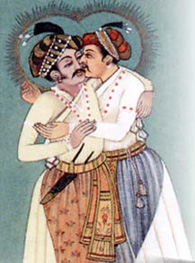Laws criminalising sex acts between members of the same sex will stay as homosexuality goes against the beliefs of the majority of the country, says the Indian government.

Section 377, which is also found in the penal codes of Singapore and Malaysia, states that whoever has voluntary sex "against the order of nature with any man, woman or animal will be punished with imprisonment for life, or with imprisonment of either description for a term which may extend to 10 years."
The announcement riled gay and human rights groups who called the laws archaic and prejudiced warned that the government's anti-gay stance might lead to increasing harassment and victimisation of the community.
"It is scary, and translates into the government sending out a message that it will prosecute homosexual men and women. The government has effectively said that its own notions of culture overrides human rights," said Tejal, a member of LABIA (Lesbian And Bisexual Women in Action) in Indian news website, mid-day.com.
The article also quoted R Sridhar, a filmmaker who was present at the meeting who believes that "society's non-acceptance" argument is not valid.
"Society has never accepted widow remarriage, ban on sati (the traditional Hindu practice of a widow immolating herself on her husband's funeral pyre), and child marriage," argued Sridhar.
A report by the United News of India has however quoted a Home Ministry affidavit, submitted in Delhi High Court, which said that the government will turn a blind eye if the homosexual/lesbian act was practised between two consenting adults in privacy as in the case of opposite-sex couples.
Despite charges that Section 377 make gay people vulnerable to extortion, abuse and violence, the affidavit justified the role of Section 377 saying that it is mainly "used to punish sexual abuse to children and to compliment lacunae in the rape laws" and "has rarely been used to punish homosexual behaviour." It added that the provision became operable only when there was a report to the police for gay sex acts.
Naz Foundation, which filed the case, said that said section was a hurdle in the AIDS awareness campaigns run by the various AIDS welfare agencies as the laws restricts many men from coming forward to receive information on how to protect themselves from the disease.











 打印版本
打印版本










读者回应
抢先发表第一个回应吧!
请先登入再使用此功能。